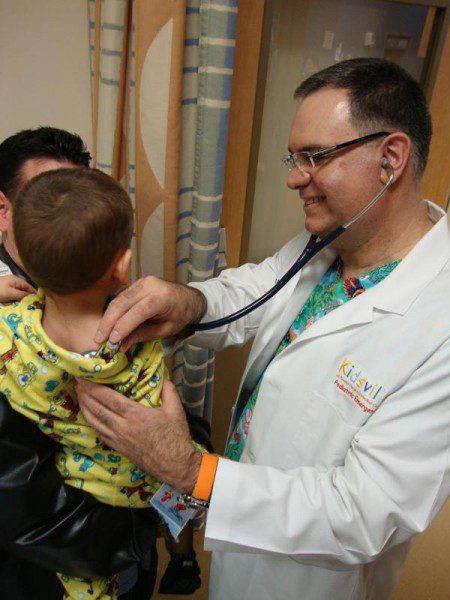
When do you need to take your child to the pediatrician’s office or to the emergency room is the question parents need to ask themselves every time their children get fever.
Dr. Georges N. Saliba, medical director of the Pediatric Emergency Room at Kendall Regional Medical Center, in Miami, explains that of all the symptoms of slight illness, the fever is what alarms parents the most, as they think that a fever always results in seizures or brain damage. This is actually a myth, affirms the Venezuelan-born doctor.
Fever is a result of infection. Infections are divided between viruses and bacteria. If the child has a slight fever, it can be treated with an over-the-counter antipyretic – acetaminophen (Tylenol) or Ibuprophen (Advil or Motrin). If the child’s fever comes down and the child is active, eats normally, and drinks liquids, then it is probably a virus and the child does not need to be taken to the emergency room. One must take care to ensure giving the correct dosage, since the instructions on the box always recommend a minimum dosage. Children who weigh more need a higher dosage. The medications do not act according to the age of the child, but according to weight.
On the other hand, if the fever persists despite having given the correct antipyretic dosage, and the child appears very frail or cries a lot, it may be due to bacteria that requires antibiotics, which must be prescribed by a doctor.
Dr. Saliba expresses that one should not wait until the child is hot to determine if he has a fever. His temperature must be taken with a thermometer. The parents or the person caring for the child must always have a thermometer in the house and know how to use it. Thermometers come in Fahrenheit (F) or Celsius (C) degrees. They are two different but equivalent measurements.
It is very important that any baby under three months of age with a temperature of 101.5F or 38.05C must be seen by a doctor, because at that early age, it is not necessary to have a high fever in order to be very ill.
Children older than three months of age, with a temperature of 101F or 38.5C are considered to have a fever. For example, a temperature of 103F or 39C is a high fever.
Pneumonia and other conditions must be ruled out when fever accompanied by a persistent cough or respiratory difficulty, as well as gastrointestinal problems; in these cases, a doctor must examine the child.
For further information, call 305-480-6601 or 877-542-2362






